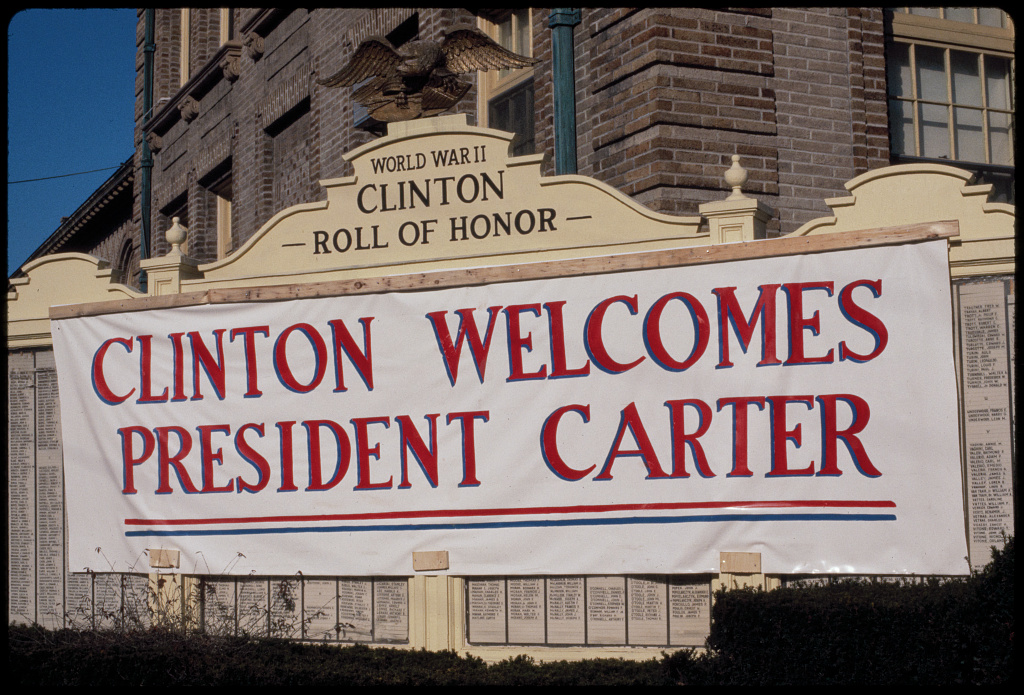
March 16, 1977
https://www.presidency.ucsb.edu/ws/index.php?pid=7180
Planned to coincide with the PLO Executive Committee discussions and in the hopes that its chairman, Yassir Arafat, would acquiesce to entering into negotiations with Israel through the United States, Jimmy Carter broke new ground in outlining the American position toward the Palestinians. Not in the body of his presentation to the Clinton, Mass community, but carefully woven into the Q and A session that followed, Carter said that there should be a homeland for the Palestinian refugees. Carter also asserted Israel’s right to exist permanently and exist in peace. For the next seven months, the Carter administration tried in vain to have the PLO accept privately Israel’s right to exist. The US effort to include the PLO in possible negotiations became sufficiently uncertain for Egyptian President Sadat to grow impatient with projected American diplomatic choreography. Coupled with his secret talks with Israeli negotiators in Morocco and Rumania, Sadat was not going to let the PLO delay his initiative to push for the return of Israeli held Egyptian Sinai.
— Ken Stein, October 2012
QUESTIONS
THE MIDDLE EAST
Q. My name is Reverend Richard Harding, and, President Carter, it’s a pleasure to welcome you to the number one Everytown, U.S.A.–Clinton, Massachusetts.
I would like to ask you, Mr. President-it seems that world peace hinges greatly on the Middle East.
THE PRESIDENT. Yes.
Q. What do you personally feel must be done to establish a meaningful and a lasting peace in that area of the world? Thank you.
THE PRESIDENT. I think all of you know that there has been either war or potential war in the Middle East for the last 29 years, ever since Israel became a nation. I think one of the finest acts of the world nations that’s ever occurred was to establish the State of Israel.
So, the first prerequisite of a lasting peace is the recognition of Israel by her neighbors, Israel’s right to exist, Israel’s right to exist permanently, Israel’s right to exist in peace. That means that over a period of months or years that the borders between Israel and Syria, Israel and Lebanon, Israel and Jordan, Israel and Egypt must be opened up to travel, to tourism, to cultural exchange, to trade, so that no matter who the leaders might be in those countries, the people themselves will have formed a mutual understanding and comprehension and a sense of a common purpose to avoid the repetitious wars and death that have afflicted that region so long. That’s the first prerequisite of peace.
The second one is very important and very, very difficult, and that is the establishment of permanent borders for Israel. The Arab countries say that Israel must withdraw to the pre-1967 borderlines; Israel says that they must adjust those lines to some degree to insure their own security. That is a matter to be negotiated between the Arab countries on the one side and Israel on the other.
But borders are still a matter of great trouble and a matter of great difficulty, and there are strong differences of opinion now.
And the third ultimate requirement for peace is to deal with the Palestinian problem. The Palestinians claim up ’til this moment that Israel has no right to be there, that the land belongs to the Palestinians, and they’ve never yet given up their publicly professed commitment to destroy Israel. That has to be overcome.
There has to be a homeland provided for the Palestinian refugees who have suffered for many, many years. And the exact way to solve the Palestinian problem is one that first of all addresses itself right now to the Arab countries and then, secondly, to the Arab countries negotiating with Israel.
Those three major elements have got to be solved before a Middle Eastern solution can be prescribed.
I want to emphasize one more time, we offer our good offices. I think it’s accurate to say that of all the nations in the world, we are the one that’s most trusted, not completely, but most trusted by the Arab countries and also Israel. I guess both sides have some doubt about us. But we’ll have to act kind of as a catalyst to bring about their ability to negotiate successfully with one another.
We hope that later on this year, in the latter part of this year, that we might get all of these parties to agree to come together at Geneva, to start talking to one another. They haven’t done that yet. And I believe if we can get them to sit down and start talking and negotiating that we have an excellent chance to achieve peace. I can’t guarantee that. It’s a hope.
I hope that we will all pray that that will come to pass, because what happens in the Middle East in the future might very well cause a major war there which would quickly spread to all the other nations of the world; very possibly it could do that.
Many countries depend completely on oil from the Middle East for their life. We don’t. If all oil was cut off to us from the Middle East, we could survive; but Japan imports more than 98 percent of all its energy, and other countries, like in Europe–Germany, Italy, France–are also heavily dependent on oil from the Middle East.
So, this is such a crucial area of the world that I will be devoting a major part of my own time on foreign policy between now and next fall trying to provide for a forum within which they can discuss their problems and, hopefully, let them seek out among themselves some permanent solution.
Just maybe as briefly as I could, that’s the best answer I can give you to that question.
